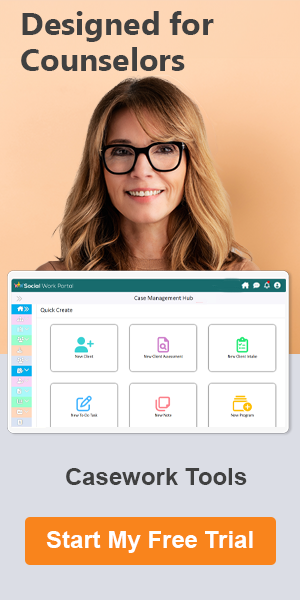Ultimate Guide to Counselling Tools and Techniques With Free Counselling Templates
Best Counselor Software and All the Counselling Resources You’ll Ever Need
From traditional face-to-face counseling to innovative online platforms, counselors utilize an assortment of counseling tools and templates to optimize their practice and enhance client outcomes.
These counselling resources offer structure, organization, and practical frameworks, enabling counselors to delve into deep conversations and provide insightful guidance. In this article, we embark on an exploration of the vast array of tools and templates available to counselors.
The tools and templates we will explore encompass a wide range of areas within counseling, including:
- counseling assessment and intake forms
- counseling notes and goal setting
- counseling methods
- counselling worksheets
- counselor software
- and much more…
 Best Counselling Resources & Tools Used in Counselling
Best Counselling Resources & Tools Used in Counselling
Join us on this journey and discover various counselling tools and templates that can help elevate your practice.
Additionally, read on to get access to counselling resources free of charge!

See Also: Best Psychosocial Assessment Template & Guide
Table of Contents: Best Online Therapy Resources
Keep on scrolling down this page to read each section or click any link below to go directly to that section.
- Introduction to Templates & Tools for Success Counseling
- Counseling Assessment Types
- Counseling Methods & Resources
- Counselling Resources Free Access
- All-in-One Best Counselor Software
- What to Expect From Counseling Toolbox Software?
- Conclusion | Best Counselor Toolbox
- FAQ | Tools for Case Management in Counseling
Don’t Miss: Best Guide on Authorization To Release Medical Records
Introduction to Counselling Tools and Techniques
Counseling is a collaborative and transformative process that helps individuals, couples, and families navigate life’s challenges, improve mental health, and foster personal growth. It provides a safe and supportive environment where clients can explore their thoughts, emotions, and behaviors while working toward positive change.
To facilitate this process, counselors utilize a variety of counseling assessment methods and counseling tools that enhance their therapeutic practice and promote effective client outcomes.
Counseling tools encompass a wide range of resources designed to support counselors in their work. Furthermore, counselling tools and techniques serve multiple purposes, including assessment, communication, treatment planning, skill-building, and progress tracking.
Stick around as we go over some of the most essential and must-have counseling tools and techniques you should be incorporating into your practice. First, we’ll take a deep dive into common types of assessments in counseling.
Related: Biopsychosocial Model, Approach, Framework, and Factors | Job Aid
Types of Assessments in Counselling | Formal and Informal Assessment in Counseling
In counseling, various types of assessments are used to gather information, evaluate clients’ needs, and measure their progress throughout the therapeutic process.
These assessments help counselors gain a comprehensive understanding of clients’ psychological well-being, identify areas of concern, and tailor interventions accordingly.
What is formal and informal assessment in counseling?
Formal and informal assessment in counseling assists counselors in accurately evaluating client issues, developing case conceptualizations, selecting empirically proven therapies, and monitoring ongoing progress
Formal assessment encompasses the utilization of structured tools such as tests, questionnaires, checklists, and rating scales to gather information. In contrast, informal assessment typically involves interviews, observations, checklists, and evaluations that lack the same level of structure or organization.
Formal and informal assessment in counseling play a vital role in providing a comprehensive understanding of clients’ needs and guiding effective therapeutic interventions.
 Counselling Worksheets & Assessments
Counselling Worksheets & Assessments
With that covered, let’s take a look at the most common types of assessments in counseling.
Common types of assessment in counseling include:
- Initial Assessment in Counseling/Intake Assessment
- Diagnostic Assessment
- Psychosocial Assessment
- Behavioral Assessment
- Self-Report Measures
- Risk Assessment
- Clinical Interviews
- Progress Monitoring and Outcome Assessment
- Bonus – Prepare Enrich Assessment
In the sections below, we’ll give you an overview of each of the common types of assessment in counselling as well as the bonus counseling assessment.
Ready? Let’s go!

Popular Article: Mental Health Assessment Guide | What You Need to Know
Initial Assessment in Counseling/Intake Assessment
Intake counseling assessment is conducted at the beginning of therapy and involves gathering background information, identifying the client’s presenting concerns, and establishing therapeutic goals.
It typically includes intake assessment forms for counselling clients, questionnaires, and structured interviews to obtain relevant personal, medical, and psychological history.
Here are some common assessment forms for counselling clients and counselling worksheets associated with the initial counseling assessment or intake assessment:
⋅ Client Information Form: This initial assessment in counseling template form collects basic personal information about the client, including their name, contact details, emergency contact information, and relevant demographic information.
⋅ Informed Consent Form: The informed consent form outlines the purpose, goals, and limitations of counseling services.
It explains the counselor’s role, confidentiality policies, and the client’s rights and responsibilities. This counselling assessment form ensures that clients understand and consent to the counseling process.
⋅ Intake Questionnaire: The intake questionnaire consists of a series of questions that gather comprehensive information about the client’s background, current concerns, and goals for counseling.
It may cover areas such as personal history, mental health history, family dynamics, social support, and previous counseling experiences.
If you’re looking for sample intake forms for counseling, you can find downloadable templates in our Case Management Hub counselor toolbox.
Alternatively, you can utilize our form builder to create your own personalized initial counseling form tailored to your counseling practice.
These resources can provide you with a starting point and guidance for developing comprehensive and client-specific sample intake forms for counseling.
Sign up for Client & Case Management Hub counselling software free tools today and gain access to initial assessment in counseling template and other online therapy resources.
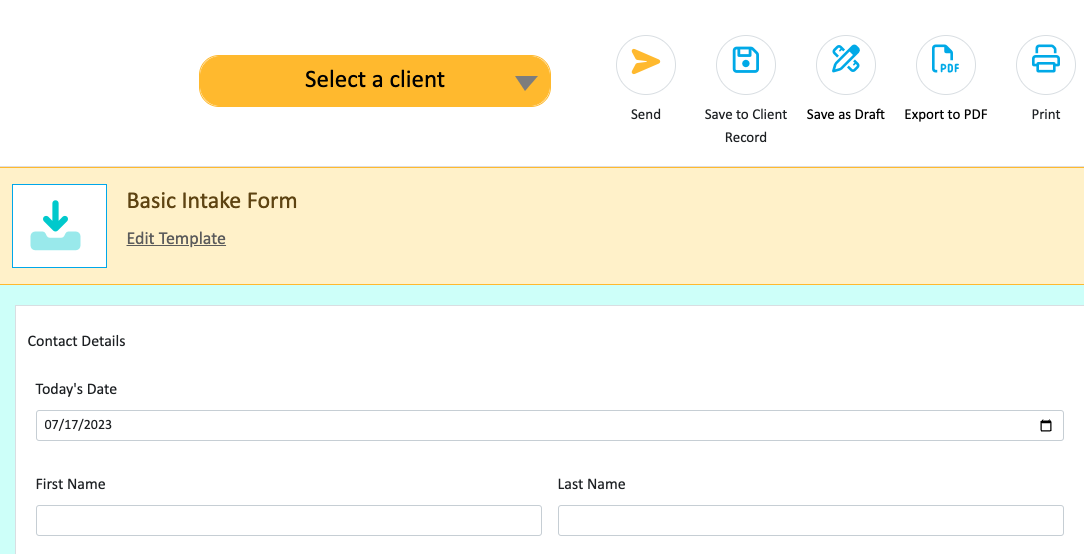 Intake Counseling Form Example – Individual Assessment in Counseling
Intake Counseling Form Example – Individual Assessment in Counseling
⋅ Release of Information Form: If collaborating with other healthcare providers or agencies is necessary, a release of information form may be used.
This form allows the client to give consent for the counselor to communicate and share relevant information with specified individuals or organizations.
Sign up now and get your copy of sample intake forms for counseling such as medical records release counselling initial assessment template, we’re here to help.
All of the above-mentioned sample intake forms for counseling and worksheets provide a foundation for gathering essential information during the initial assessment and establishing a collaborative relationship.
Would you like to share feedback on any specific talk therapy toolkit you’ve tried in the past? If so, contact the Social Work Portal Team.
Diagnostic Assessments – Assessment Tools for Counseling
Diagnostic types of assessment in counselling aim to identify and diagnose mental health disorders based on standardized criteria.
Diagnostic assessments utilize various tools and counselling worksheets to gather information and aid in the process of diagnosing mental health disorders.
These tools and counseling worksheets help mental health professionals to systematically assess symptoms, gather relevant data, and make informed diagnostic decisions.
Here are some common examples of diagnostic assessment tools for counselling services:
- Diagnostic Questionnaires and Rating Scales
- Diagnostic Checklists
- Counselling Worksheets for Symptom Analysis
- Diagnostic Decision Trees
- Diagnostic Formulation Counselling Worksheets
It’s important to note that the selection of specific diagnostic assessment tools and worksheets may vary based on the mental health professional’s training, the client’s needs, and the specific disorders being evaluated.
Mental health professionals utilize these counseling worksheets and tools in conjunction with clinical judgment, thorough assessment, and careful consideration of the client’s unique circumstances to arrive at accurate and clinically meaningful diagnoses.
Read More: Guide on How to Build & Grow Your Counselling Practice
Psychosocial Assessments – Holistic Evaluation in Counseling
Psychosocial assessment evaluates an individual’s social, psychological, and environmental factors that may impact their mental health and overall well-being.
To gain a holistic understanding of the client’s context, these assessments explore areas such as:
- Relationships
- Support systems,
- Cultural background, and
- Daily functioning
There are various psychosocial counseling templates available, tailored to different populations and presenting concerns.
 Psychosocial Counselling Assessment Form
Psychosocial Counselling Assessment Form
Some examples of psychosocial counseling templates include:
- General Psychosocial Assessment Template
- Psychosocial Assessment for the Elderly
- Psychosocial Assessment for Substance Abuse
- Psychosocial Assessment for Military Members and Veterans
- Psychosocial Assessment Template for Victims of Physical or Emotional Abuse
- Psychosocial Assessment Template for Adolescents
All of these psychosocial counseling templates offer a structured approach to gather information relevant to specific populations and presenting concerns.
They assist social workers in conducting a comprehensive assessment, understanding clients’ needs, and guiding appropriate interventions.
For those of you interested in general psychosocial counselling assessment template, we have good news.
All-in-One Client & Case Management Hub counselor software comes with a lot of counselling resources free of charge!
Sign up for our free online therapy resources now and get access to psychosocial and biopsychosocial counseling templates.
Behavioral Assessment – Behavioral Therapeutic Tools for Counselors
Behavioral assessments focus on observing and measuring clients’ behaviors, often in natural or specific settings.
Behavioral assessments involve the use of various tools and counseling worksheets to gather information about an individual’s behaviors, functional abilities, and areas of concern.
These assessments focus on observable behaviors, providing valuable data for understanding and addressing behavioral challenges.
Here are some common examples of tools and counseling worksheets used in behavioral assessment:
- Behavior Checklists
- Direct Observation Forms
- Functional Behavior Assessment (FBA) Counseling Worksheets
- Behavior Rating Scales
- Behavior Contracts
- Functional Analysis Counselling Worksheets
It’s important to note that behavioral assessments may involve a combination of counselling worksheets and tools, tailored to the specific needs and goals of the assessment.
The data gathered through these assessments inform the development of behavior management plans, intervention strategies, and progress monitoring for individuals across various settings, such as homes, schools, or therapeutic environments.

Related: Best Counseling Intake Form, Sheets, and Questions
Self-Report Measures – Therapy Tools for Counselors
Self-report measures are types of assessment tools in counseling tools that rely on individuals’ self-reported responses to gather information about their thoughts, feelings, behaviors, attitudes, or beliefs.
These measures assess various constructs such as:
- depression
- anxiety
- self-esteem
- stress,
- or quality of life.
Want to go paperless with all your counseling assessment forms and templates?
Client and Case Management counselor software is exactly what you need!
Our counseling toolbox comes with all forms needed for counseling private practice.
From a wide counselling notes template selection to free sample letters for clients and colleagues, sample intake forms for counseling, different assessment tools for success counseling, and so much more!
Join SWP Case Management Hub and find out why our counseling EMR software is the only counselors toolbox you’ll need.
Risk Assessment Counselling Process
Risk assessment counselling process is an essential part of practice.
Risk assessment counselling aims to identify and evaluate potential risks and safety concerns for individuals receiving mental health services.
Counselling risk assessment template involves assessing the client’s risk of self-harm, harm to others, or any other risks that may arise during the course of therapy.
Here are key points to understand about risk assessment counseling process:
⋅ Purpose: The primary purpose of risk assessment is to ensure the safety and well-being of the client, as well as those around them. It involves identifying any potential risks or warning signs that may require immediate attention and appropriate intervention.
⋅ Assessment Factors: Risk assessment counselling process typically involves evaluating various factors, including the presence of suicidal or self-harm ideation, previous self-harming behaviors, history of suicide attempts, current emotional distress, access to means, social support network, substance use, and any indications of violence or harm towards others.
⋅ Clinical Judgment: Risk assessment requires the use of clinical judgment by mental health professionals to evaluate and interpret the gathered information.
They consider the severity and immediacy of the risk factors, as well as protective factors, in order to make informed decisions about the level of risk and appropriate interventions.
 Risk Assessment in Counseling Procedures and Practices
Risk Assessment in Counseling Procedures and Practices
⋅ Communication and Collaboration: Risk assessment counselling process often involves communication and collaboration with other professionals or stakeholders, such as supervisors, colleagues, or emergency services.
It is important to establish clear protocols for sharing risk-related information to ensure timely and appropriate support and interventions.
Looking for a convenient way to communicate risk to your colleagues?
Client & Case Management Hub counselor software has a solution that helps you handle and communicate risk timely and efficiently.
With our EHR for mental health counseling Staff-to-Staff Client Alert feature, you can alert colleagues about a client situation or issue with just few clicks.
Get started with Case Management Hub mental health counseling software and take your counseling practice to a whole new level.
⋅ Counselling Risk Assessment Template: Mental health professionals need to document the assessment process, identified risk factors, interventions implemented, and any ongoing monitoring or follow-up plans.
It’s easier if you have a counselling risk assessment template so you can continuously record the assessment process and help ensure continuity of care.
⋅ Ongoing Monitoring and Review: Risk assessment counselling is not a one-time event but an ongoing process throughout the counseling relationship.
Mental health professionals regularly monitor and reassess the client’s risk levels, particularly during times of increased stress or significant life events.
Please note that risk assessment is a specialized area of practice and should be conducted by qualified mental health professionals with appropriate training and expertise.
Additionally, risk assessment should always be conducted within the ethical and legal frameworks governing the practice of counseling to prioritize the safety and well-being of clients and the community.
Don’t Miss: Best Guide for Children Depression and Anxiety Assessment
Clinical Interviews – Informal Assessment Instruments in Counseling
Clinical interviews are assessment instruments in counseling that involve face-to-face conversations between the counselor and client, aimed at gathering comprehensive information about the client’s history, concerns, and experiences.
These interviews may be:
- Structured
- Semi-structured, or
- Unstructured and allow for in-depth exploration of clients’ thoughts, emotions, and life circumstances.
Progress Monitoring and Outcome Assessment
Progress monitoring and outcome assessment involve assessing clients’ progress throughout therapy and evaluating treatment effectiveness.
To determine the impact of therapy on clients’ well-being, this can be done through:
- repeated administration of self-report measures
- session-by-session feedback, or
- specific outcome measures.
It’s important for counselors to choose types of assessments in counseling that are appropriate for the client’s needs, consider cultural factors, and adhere to ethical guidelines in the assessment process.

Popular Article: The Best Questions Counselors Ask Clients
BONUS COUNSELING ASSESSMENT – Prepare Enrich Assessment
Prepare enrich assessment is a widely used premarital and marital assessment tool designed to assess various aspects of a couple’s relationship.
Prepare enrich couples assessment provides valuable insights into areas such as:
- Communication
- Conflict Resolution
- Financial Management
- Family Dynamics
- Sexual Intimacy
- Personality Dynamics, and
- Future Goals
The prepare enrich assessment template serves as a structured framework for conducting the assessment.
It typically includes a series of questionnaires and scales that couples complete individually.
 Prepare Enrich Counseling Assessment – CounselingWorksheets
Prepare Enrich Counseling Assessment – CounselingWorksheets
Prepare enrich assessment covers various dimensions of the relationship, allowing couples to reflect on their strengths, growth areas, and areas that may require attention and improvement.
Couples respond to the questionnaire items based on their experiences and perceptions of their relationship.
Once the a prepare enrich couples assessment is completed, the counselor or facilitator analyzes the responses and generates a comprehensive report.
The prepare enrich assessment report provides:
- summary of the couple’s strengths and growth areas,
- highlights potential areas of concern, and
- offers recommendations for enhancing the relationship.
Prepare enrich assessment report serves as a valuable resource for guiding the counseling process and facilitating meaningful discussions between the couple.
The prepare enrich assessment offers a structured and evidence-based approach to assessing and strengthening relationships.
By providing a comprehensive understanding of the couple’s dynamics and areas for growth, the prepare enrich couples assessment serves as a foundation for tailored interventions and promoting healthy relationship development.
Common Counseling Assessment Methods | Assessment Counseling Resources
Counseling assessment methods are techniques and approaches used by counselors to gather information, evaluate clients’ needs, and gain a comprehensive understanding of their concerns and strengths.
These methods provide a foundation for assessment in counseling procedures and practices and developing effective treatment plans and guiding the counseling process.
Most common counseling assessment methods are:
- Unstructured Interview
- Structured Interview
- Semi-Structured Interview
- Standardized Instruments
- Projective Techniques
- Checklists and Questionnaires
- Observation
- Rating Scales
On the other hand, counseling assessment tools are an integral part of the counseling process, providing counselors with valuable information about clients’ backgrounds, concerns, and strengths.
Counselling assessment tools assist in understanding clients’ unique experiences, identifying specific issues, and tailoring interventions to meet their needs.
In the sections below we’ll go over most common counseling assessment methods along with the counseling tools used with each of them.
Let’s get right into it!
Do you have any questions about free forms needed for counseling private practice? Do you know of any strictly counseling notes software? If so, contact the Social Work Portal Team.
1. Unstructured Interview | Methods and Tools of Counseling
In an unstructured interview, counselors mainly rely on their clinical skills, active listening, and empathetic engagement to explore clients’ concerns in an open and flexible manner.
While the unstructured interview does not involve specific standardized measures, counselors may employ various techniques and counselling resources to facilitate the process.
Let’s go over counseling tools commonly used in unstructured interviews:
⋅ Counseling Notes: Counselors often take notes during an unstructured interview to record key points, client responses, and observations.
Taking counseling notes helps counselors stay focused, remember important details, and reflect on the session afterward.
The process of taking counseling notes allows for better documentation and aids in recalling specific information during the therapeutic process.
Having counselling notes template can be of great help during the session as it saves time and helps counselor focus on what client is sharing.
If you’re looking for counselling notes template that you can use in your practice, we have a solution for you.
SWP’s Client Assessment & Management Platform comes equipped with a selection of counseling note template resources including:
- Basic Counseling Notes
- Intake Note
- SOAP Note
- GIRP Progress Note
- BIRP Progress Note
- DAP Progress Note
- PAIP Note; and an option to
- Create Your Own Custom Counseling Notes
From serving as a comprehensive counseling notes software to functioning as a reliable counseling practice management software, Case Management Hub is the only solution you need.
Sign up now and experience the transformative power of this all-in-one solution for counselors.
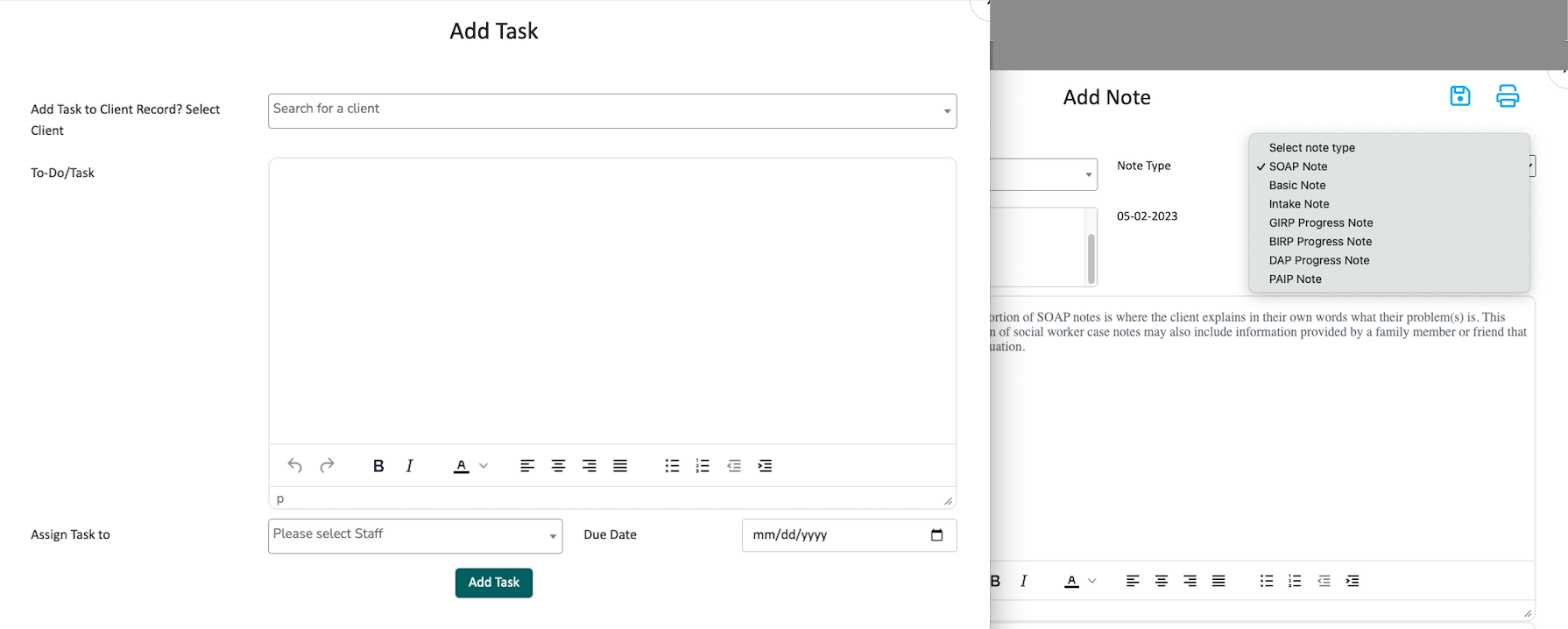
Tasks and Counselling Notes Template – Case Management Hub Counselors Toolbox
⋅ Reflective Listening: Reflective listening is one of the tools for success counseling that’s used in the unstructured interview to demonstrate understanding and validate clients’ experiences.
It involves paraphrasing, summarizing, and restating clients’ thoughts, feelings, and concerns.
⋅ Open-Ended Questions: Open-ended questions are essential counselling tools in the unstructured interview, allowing clients to freely express themselves and share their experiences.
These questions facilitate a more comprehensive understanding of clients’ concerns and allow for a richer therapeutic dialogue.
⋅ Probing Questions: Probing questions are used as counselling tools to further explore specific topics, challenge assumptions, or invite clients to delve deeper into their experiences.
These questions can help uncover underlying issues, increase self-awareness, and promote deeper evaluation in counseling.
⋅ Empathetic Responses: Empathetic responses are crucial in an unstructured interview.
Through the expression of genuine empathy, understanding, and validation, counselors establish a secure and non-judgmental space, enabling clients to feel acknowledged, supported, and empowered to express themselves more freely.

Types of Assessments in Counselling
⋅ Non-Verbal Communication: Non-verbal communication plays a significant role in the unstructured interview.
Counselors employ a range of non-verbal cues, including eye contact, body posture, facial expressions, and gestures, to effectively communicate attentiveness, empathy, and a secure presence.
This mutual exchange of non-verbal communication enriches the counseling and assessment process while deepening understanding.
⋅ Silence: Silence can be one of the most powerful counseling tools in the unstructured interview.
It allows for deeper exploration, encourages clients to access their inner experiences, and can lead to important insights and breakthroughs in evaluation in counseling.
As you may have already noticed, unstructured interview counseling assessment method primarily relies on the counselor’s skills, attunement, and ability to create a supportive therapeutic relationship.
While counselling assessment tools like note-taking and reflective listening are commonly used, the emphasis is on the counselor’s active listening, empathy, and flexible engagement to guide the conversation and facilitate meaningful exploration of clients’ concerns.
Next counselling assessment method we’ll explore is structured interview.
See Also: Best Biopsychosocial Assessments, Intakes and Templates | Job Aid
2. Structured Interview | Methods and Tools in Counseling
In contrast to the open-ended and flexible nature of the unstructured interview, structured interview tools are standardized assessment instruments in counseling.
This counseling assessment method ensures the systematic collection of specific information and enhances reliability, ensuring that relevant topics are covered in a structured manner.
However, their structured nature may restrict in-depth exploration and confine the initial assessment in counseling within the boundaries of the predetermined questions, potentially limiting the scope of understanding.
Here are some structured interview tools used in counseling:
⋅ Structured Clinical Interview for DSM Disorders (SCID): The SCID is a widely used diagnostic interview tool that follows a structured format based on the criteria outlined in the Diagnostic and Statistical Manual of Mental Disorders (DSM).
This counseling and assessment tool covers various mental health disorders and assists in making reliable and valid diagnoses.
⋅ Autism Diagnostic Interview-Revised (ADI-R): The ADI-R is a structured interview tool used for diagnosing Autism Spectrum Disorder (ASD).
ADI-R counselling assessment questionnaire covers various domains related to social interaction, communication, and repetitive behaviors.
The ADI-R provides a standardized approach to gathering information for ASD assessments and evaluation in counseling.
⋅ Mini International Neuropsychiatric Interview (MINI): The MINI is a brief structured interview tool designed to assess major psychiatric disorders, including mood disorders, anxiety disorders, psychotic disorders, and substance use disorders.
This individual assessment in counseling follows a standardized format and aids in diagnosing common mental health conditions.
 Counseling Resources – Talk Therapy Toolkit Options
Counseling Resources – Talk Therapy Toolkit Options
⋅ Anxiety Disorders Interview Schedule for DSM-5 (ADIS-5): The ADIS-5 is a structured interview tool specifically designed to assess anxiety disorders based on DSM-5 criteria.
This counseling self assessment questionnaire and interview covers a range of anxiety disorders, including generalized anxiety disorder, panic disorder, social anxiety disorder, and specific phobias.
⋅ Schedule for Affective Disorders and Schizophrenia (SADS): The SADS is a structured interview counseling and assessment tool used in research and clinical settings to assess mood disorders, schizophrenia, and related conditions.
It provides a standardized approach to collecting information on symptoms, course of illness, and psychiatric history.
⋅ Addiction Severity Index (ASI): The ASI is a structured interview tool used in counselling in substance abuse treatment settings to assess the severity of substance use disorders and related problems.
This individual assessment in counseling covers multiple domains, including substance use, medical history, psychiatric functioning, employment, and legal issues.
All of the mentioned structured interview tools for counseling provide a standardized framework for assessing specific mental health conditions or gathering information in a systematic and consistent manner.
These counselling assessment tools help ensure that important topics are covered, enhance reliability across different interviewers, and facilitate diagnostic decision-making and evaluation in counseling and research settings.
Do you have any input into career assessment tools for counselors? Do you have any tips about career assessment tools for counselors in general? Click here to contact the Social Work Portal Team.
3. Semi-Structured Interview | Methods and Tools of Counseling
The semi-structured interview combines elements of both the unstructured and structured interviews.
This counseling and assessment method offers flexibility in terms of guidelines and tailoring to the client’s needs while maintaining a level of consistency by using a predefined framework.
This method provides better reliability than unstructured interviews, allows for customization, and ensures some standardization of evaluation in counseling.
However, it is still subject to counselor bias, and the wording of questions may influence client responses.
Semi-structured interview tools are assessment instruments in counseling that combine elements of both structured and unstructured interviews.
Below are some of semi-structured interview tools used in counseling:
⋅ Life History Interview: The life history Interview is a semi-structured tool that explores clients’ personal history, experiences, and significant life events.
This individual assessment in counseling typically covers areas such as family background, education, relationships, career, and major life transitions.
⋅ Modified Overt Aggression Scale (MOAS): The MOAS is a semi-structured interview tool used to assess aggressive and violent behaviors in individuals.
This counselling assessment form includes questions about the frequency, severity, and context of aggressive acts, as well as triggers and consequences. The interviewer follows a structured format but also has the flexibility to probe for additional details.
⋅ Cultural Formulation Interview (CFI): The CFI is a semi-structured interview tool developed by the DSM-5 to assess clients’ cultural background, beliefs, values, and cultural factors influencing their mental health.
CFI counselling assessment questionnaire includes a set of structured questions that encourage clients to discuss their cultural identity, cultural explanations of illness, and cultural stressors, while also allowing for open-ended exploration.
⋅ Brief Psychiatric Rating Scale (BPRS): The BPRS is a semi-structured interview tool used to assess the severity of psychiatric symptoms in individuals.
This client assessment form counselling tool covers a range of symptom domains such as anxiety, depression, hallucinations, and disorganized thinking. The interviewer follows a set of standardized questions while allowing for additional exploration based on clients’ responses.
Semi-structured interview counselling tools offer a balance between structure and flexibility, allowing for a more comprehensive assessment while maintaining some consistency in data collection.
Moreover, these counselling resources provide a guide for exploring specific topics while allowing the interviewer to adapt and explore relevant areas based on clients’ unique experiences and needs.
Don’t Miss: Best Illness Management and Recovery Guide | Job Aid
4. Standardized Instruments | Standardized Counseling Assessment Tools
Standardized instruments are formal counseling assessment tools with established norms and scoring procedures.
These instruments have undergone rigorous development and validation processes and provide reliable and valid measures of specific constructs, such as symptoms, personality traits, or emotional well-being.
They offer quantifiable results, objective scoring, and may reveal diagnostic information.
However, they can be costly, time-consuming, may exhibit cultural bias, and should not be used as the sole basis for diagnosis.
Standardized instruments are widely used in counseling to gather objective and quantifiable data about clients’ experiences, behaviors, symptoms, or personality traits.
These assessment tools in counselling follow a standardized format and have established norms, reliability, and validity.
Below we have outlined some common types of standardized counselling assessment tools:
⋅ Pediatric Symptom Checklist (PSC): The PSC is a screening tool used to assess a broad range of emotional and behavioral problems in children and adolescents.
PSC counselling assessment form is completed by parents or caregivers and helps identify potential areas of concern that may require further evaluation or intervention.
The PSC initial counseling form helps identify potential areas of concern and serves as a screening tool to determine whether further evaluation in counseling or intervention is needed.
This counseling assessment provides valuable information for clinicians to better understand the child’s emotional and behavioral well-being.
Looking for PSC counseling assessment template? Look no further!
Sign up for Case Management Hub counselor software and gain access to PSC tool and many other counselling assessment forms.
⋅ Alcohol Use Disorders Identification Test (AUDIT): The AUDIT is a screening tool used to assess alcohol consumption and identify potential alcohol-related problems.
This counselling assessment template consists of questions that assess the frequency and quantity of alcohol consumption, providing an indication of risky drinking behaviors.
This evaluation in counseling aids in identifying potential alcohol-related problems and supports early intervention.
⋅ Generalized Anxiety Disorder Screener (GAD-7): The GAD-7 is a counseling self assessment questionnaire measure used to screen for generalized anxiety disorder.
This initial assessment in counseling consists of seven items that assess the frequency and severity of anxiety symptoms.
The GAD-7 counseling and assessment tool helps identify individuals who may require further evaluation or treatment for anxiety-related concerns.
You can find GAD-7 counselling assessment form template and many other assessment forms for counselling clients in our All-in-One Client & Case Management counseling practice management software.
⋅ Patient Health Questionnaire-9 (PHQ-9): The PHQ-9 is a self-report client assessment form counselling measure used to assess depressive symptoms and screen for major depressive disorder.
PHQ-9 counselling assessment template consists of nine items that assess the frequency and severity of depressive symptoms.
The PHQ-9 helps identify individuals who may be experiencing significant levels of depression.
⋅ Screen for Child Anxiety Related Emotional Disorders (SCARED): The SCARED is a self-report measure used to assess anxiety symptoms in children and adolescents.
SCARED initial counseling form includes scales that assess various anxiety-related domains, such as generalized anxiety, separation anxiety, social anxiety, panic disorder, and school avoidance.
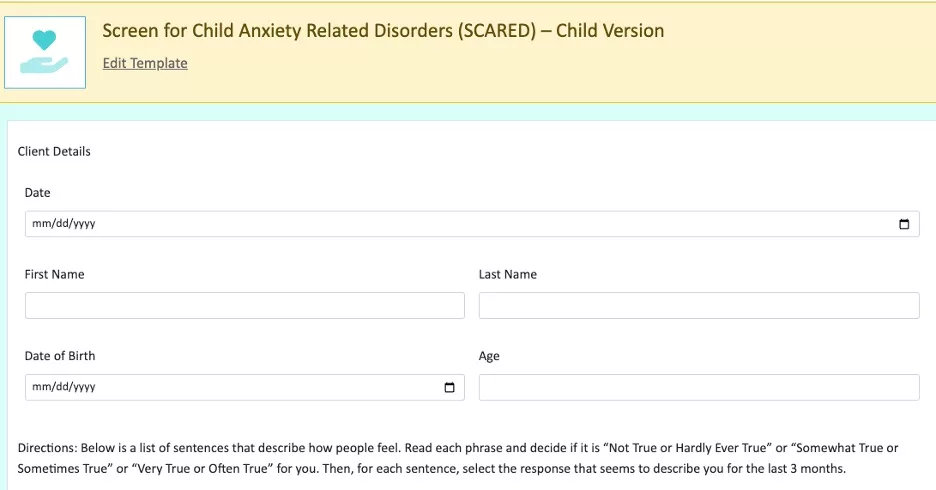
CMH Counselor Toolbox – SCARED Self-Report Measure
⋅ Primary Care PTSD Screen for DSM-5 (PC-PTSD-5): PC-PTSD-5 is one of standardized tools for counseling used to screen for post-traumatic stress disorder (PTSD) in primary care settings.
This counseling self assessment questionnaire consists of five items designed to assess the presence of PTSD symptoms as defined by the Diagnostic and Statistical Manual of Mental Disorders, 5th edition (DSM-5).
The PC-PTSD-5 has been developed and validated to provide a brief and reliable screening tool for identifying individuals who may be experiencing PTSD symptoms.
This counseling assessment template offers a standardized approach to screening for PTSD in primary care settings, allowing for quick and efficient identification of potential cases.
If you’re looking for counseling practice software that comes loaded with sample intake forms for counseling, counselling assessment forms, free sample letters, counselling notes template resources, and other counselling assessment tools, you have to check out Case Management Hub counselors toolbox.
Join Client & Case Management Hub Counseling EHR Software today and enhance your practice.
⋅ Adult ADHD Self-Report Scale (ASRS-v1.1): The Adult ADHD Self-Report Scale (ASRS-v1.1) is a standardized instrument specifically designed to assess symptoms of Attention-Deficit/Hyperactivity Disorder (ADHD) in adults.
It consists of 18 items that measure ADHD symptoms based on the DSM-5 criteria.
The ASRS-v1.1 counselling assessment forms cover symptoms such as inattention, hyperactivity, and impulsivity, helping clinicians to evaluate the presence and severity of ADHD symptoms in adults.
These standardized instruments and counseling templates provide efficient and reliable ways to screen for specific conditions, evaluate symptoms, and identify areas of concern.
They assist counselors in gathering important information, making informed decisions, and guiding appropriate interventions for clients.
It is essential to use these counseling tools in conjunction with clinical judgment and a comprehensive individual assessment in counseling to ensure accurate evaluations and tailored treatment approaches.
5. Projective Techniques | Methods and Tools in Counseling
Projective techniques involve presenting clients with ambiguous stimuli, such as inkblots or incomplete sentences, to elicit unconscious thoughts, emotions, and perceptions. The client’s responses are then interpreted by the counselor.
Projective techniques are a set of psychological assessment tools in counselling used to explore unconscious aspects of an individual’s personality, emotions, thoughts, and experiences.
However, their psychometric properties are weaker than standardized instruments, and interpretation is subjective, relying on the counselor’s training and expertise.
Here are some commonly used projective techniques/psychological assessment tools in counselling:
⋅ Rorschach Inkblot Test: The Rorschach test involves presenting clients with a series of inkblots and asking them to describe what they see in each image.
The test aims to reveal the client’s thought processes, emotions, and personality traits.
⋅ Sentence Completion Tests: Sentence completion tests involve providing clients with incomplete sentences and asking them to complete them.
The responses can provide insights into the client’s thoughts, attitudes, beliefs, and emotions. These evaluation tools in counselling can be tailored to specific areas of interest, such as self-esteem, relationships, or future aspirations.
⋅ Drawing Tools Used in Counselling: Drawing counselling tools and techniques involve asking clients to create drawings that represent certain themes or situations.
For example, the Draw-a-Person test asks clients to draw a person, which can provide information about body image, self-perception, and emotional states.
Other drawing counseling tools and techniques, such as the House-Tree-Person test, elicit drawings that reflect the client’s perception of their environment and interpersonal relationships.
Projective counselling tools and techniques provide clinicians with indirect access to the client’s unconscious and can reveal information that may not be readily accessible through self-report measures.
They are used to gain a deeper understanding of the client’s inner world, explore complex dynamics, and assist in treatment planning.
However, it’s important to note that the interpretation of projective counseling tools and techniques requires expertise and should be done by trained professionals who are familiar with the specific techniques and their limitations.
Related: Best Mental Health Intake Assessment Guide With Examples
6. Checklists and Questionnaires | Methods & Evaluation Tools in Counselling
Checklists and questionnaires are widely used assessment tools in counseling for gathering information, assessing symptoms, measuring progress, and monitoring various aspects of clients’ well-being.
Checklists and questionnaires consist of predefined items that clients respond to by checking or rating their agreement or frequency of experiences.
These counseling assessment tools allow for efficient data collection, cross-checking of information, and can be cost-effective.
However, they may have weaker psychometric properties, potential for bias, and should be used in conjunction with other types of assessments in counseling to ensure comprehensive evaluation.
Here are some common checklists and questionnaires used in counseling:
⋅ Beck Depression Inventory (BDI): The BDI is a self-report questionnaire used to assess the severity of depressive symptoms.
BDI counselling assessment questionnaire consists of multiple items that clients rate based on the presence and intensity of specific symptoms associated with depression.
⋅ State-Trait Anxiety Inventory (STAI): The STAI is a self-report measure that assesses both temporary (state) and enduring (trait) anxiety levels.
STAI counselling assessment form consists of separate scales that measure anxiety symptoms experienced at the present moment and individual differences in anxiety proneness.
⋅ Outcome Questionnaire-45 (OQ-45): The OQ-45 is a self-report measure and counselling assessment form template used to assess clients’ psychological distress and well-being.
OQ-45 covers various domains, including symptoms, interpersonal relationships, and overall functioning.
⋅ Perceived Stress Scale (PSS): The PSS is a self-report questionnaire that assesses individuals’ perception of stress in their lives.
PSS counseling and assessment scale measures the frequency and intensity of stress-related thoughts and feelings over a specified period.
⋅ Brief Symptom Inventory (BSI): The BSI is a self-report measure used to assess a broad range of psychological symptoms.
BSI counselling assessment form consists of multiple subscales measuring symptoms of depression, anxiety, somatization, and other psychiatric conditions.
⋅ Conflict Resolution Styles Inventory (CRSI): The CRSI is a questionnaire used to assess individuals’ preferred conflict resolution styles.
CRSI therapy tools for counselors help identify how clients approach and handle conflicts, providing insight into their interpersonal dynamics and communication patterns.
All of the checklists and questionnaires we mentioned are therapeutic tools for counselors that offer a structured and standardized way to assess specific constructs, symptoms, and client experiences.
These types of assessment in counseling provide quantifiable data that can inform treatment planning, monitor progress, and evaluate the effectiveness of interventions.
Additionally, they can be useful for tracking changes over time and establishing a baseline for comparison.
It’s important for counselors to select and administer appropriate counselling tools and counselling resources based on their clients’ needs and goals, while also considering the psychometric properties and validity of the instruments.
7. Observation | Methods & Tools for Success Counseling
Observation involves systematically observing clients’ behaviors, interactions, and responses in natural or controlled settings.
Observation counseling tools provide insights into clients’ non-verbal cues, social interactions, and contextual factors.
It is particularly useful when verbal communication may be limited or biased.
However, observations are influenced by the observer’s relationship with the client and the specific setting, so these types of assessments in counseling can introduce subjectivity and potential limitations.
While observation can be conducted informally during counseling sessions, there are also specific counselling resources, tools, and protocols available to enhance the systematic observation process.
We’ve outlined some commonly used observation counseling assessment tools:
⋅ Behavioral Observation: Behavioral observation involves directly observing and recording clients’ behaviors and actions. This can be done using a structured counselling observation checklist or rating scale that captures specific behaviors of interest.
For example, a counselor may use an observation tool or counselling observation checklist to track behaviors related to social skills, emotional regulation, or problem-solving abilities.
⋅ Parent-Child Interaction Counseling Assessment: Observing parent-child interactions can provide insight into the quality of the parent-child relationship and identify areas for intervention.
Counseling tools and techniques like the Dyadic Parent-Child Interaction Coding System (DPICS) and the Parent-Child Interaction Assessment-II (PCIA-II) help assess parenting behaviors, communication, and attachment.
 Parent Child Counseling Assessment
Parent Child Counseling Assessment
⋅ Direct Behavioral Assessment: Direct behavioral counseling assessment involves observing and documenting specific behaviors or skills related to a particular goal or target.
This counseling assessment method is often used in interventions, such as behavior modification programs.
These observation assessment tools used in counselling enhance the counselor’s ability to systematically observe and evaluate clients’ behaviors, interactions, and responses.
They provide valuable data for treatment planning, intervention development, and monitoring progress over time.
It’s important to ensure ethical considerations and obtain informed consent when using observation methods in counseling.
Do you have any questions assessment in counseling procedures and practices? Do you know of any talk therapy toolkit counselors should know about? Click here to contact the Social Work Portal Team.
8. Rating Scales | Methods and Tools of Counseling
Rating scales counselling assessment tools are a commonly used in counseling to assess and measure various aspects of clients’ experiences, behaviors, symptoms, or attitudes.
These counseling and assessment scales involve using standardized rating systems to assign numerical or descriptive ratings to specific constructs.
Below we’ll go over some examples of rating scale counselling tools:
⋅ Likert Scales: Likert scales counseling templates involve a series of statements or items that clients rate based on their level of agreement or disagreement.
Typically, a 5 or 7-point scale is used, ranging from “strongly disagree” to “strongly agree.”
These tools for counselling services can assess various constructs, such as self-esteem, satisfaction, motivation, or treatment outcome.
⋅ Numeric Rating Scales (NRS): Numeric Rating Scales involve clients rating their experiences or symptoms on a numerical scale, typically ranging from 0 to 10.
These counselling tools can be used to assess pain intensity, anxiety levels, sleep quality, or other quantifiable experiences.
⋅ Behavior Rating Scales: Behavior rating scales are used to assess and quantify specific behaviors exhibited by clients or observed in specific contexts.
These scales are often completed by multiple raters, such as parents, teachers, or caregivers, who provide ratings based on observable behaviors.
Examples of these counseling tools include the Child Behavior Checklist (CBCL) and the Behavior Assessment System for Children (BASC).
⋅ Symptom Severity Scales: Symptom severity scales are used to assess the severity of specific symptoms related to mental health conditions.
For example, the Hamilton Rating Scale for Depression (HAM-D) or the Positive and Negative Syndrome Scale (PANSS) are rating scales used to evaluate the severity of depressive symptoms or symptoms of schizophrenia, respectively.
These counselling tools and techniques provide a standardized and quantifiable way to assess specific constructs, symptoms, or experiences in counseling.
They help counselors gather consistent and objective data, monitor progress, and evaluate treatment outcomes.
The selection of an appropriate rating scale depends on the specific construct being assessed and the goals of the counseling assessment.
With common counseling assessment methods and tools covered, next we’ll take a look at different types of assessments in counseling.

Popular Article: Best Private Psychotherapy Practice Guide
Counselling Resources Free Access | Counselling Tools PDF, DOC, and PPT
At our core, we are advocates of efficient counseling tools and practices, committed to empowering counselors worldwide.
As part of our mission, in our counselling software free version, we offer a wide range of helpful counselling resources counseling worksheets, including free counseling templates, counseling notes templates, and intake counseling templates, among others.
We firmly believe that these downloadable online therapy resources and free forms needed for counseling private practice can significantly enhance counselors’ practice, enabling them to deliver better support and care to their clients.
By providing these valuable counselling resources free tools, we strive to contribute to the professional growth and effectiveness of counselors everywhere.
Sign up for SWP counselling resources free of charge and get:
- Psychosocial Counseling Assessment Template
- Biopsychosocial Counseling Assessment Template
- Best Questions Counselors Ask Clients PPT Slides
- Counseling Intake Forms Needed for Counseling Private Practice
- Genogram Template
- Culturagram Template
- Ecomap Template
- SOAP Counselling Notes Template
- HIPAA Medical Records Release Form
- CAGE Questionnaire for Substance Abuse Counselors
- And more counselling tools PDF, DOC, and PPT versions…
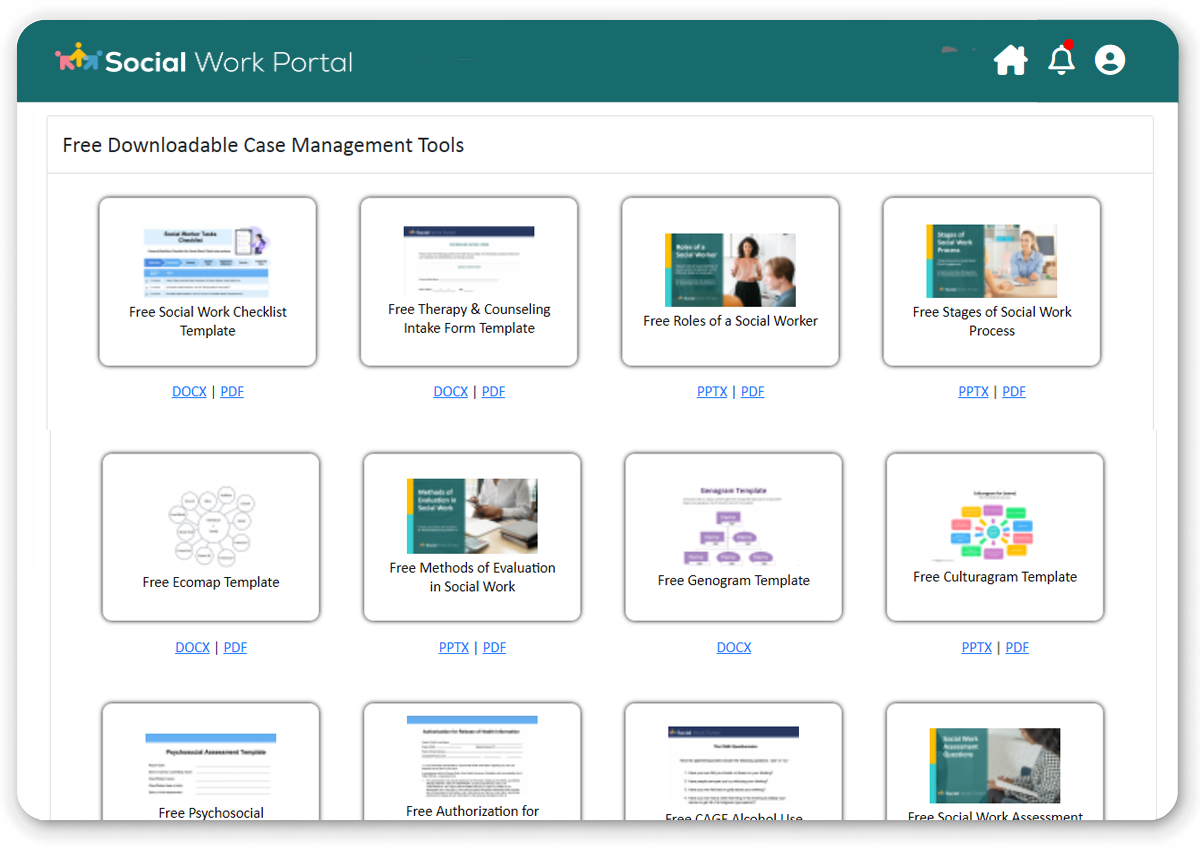 Get Case Management Hub Counselling Resources Free of Charge
Get Case Management Hub Counselling Resources Free of Charge
These free forms needed for counseling private practice are available in PDF, DOC, and PPT formats, allowing for easy download and use on various devices.
On top of that, these downloadable free forms needed for counseling private practice offer flexibility and convenience.
You can edit them according to your specific needs and preferences and use in your counselling practice.
Sign up for free.
Download all our free mental health and therapy tools.
No credit card required.
All-in-One Client & Case Management Platform | Counseling Practice Management Software
When it comes to providing comprehensive care for mental health clients, efficient client and case management in counseling is essential.
This is where Case Management Hub, best counseling software and EHR for mental health counseling, excels.
Designed specifically for mental health professionals, Case Management Hub offers a wide range of features and benefits that make it the best choice for counseling EMR software.
Let’s delve into the reasons why:
⋅ Tailored Counselor Software – Counselors Toolbox
Case Management Hub understands the unique requirements of mental health professionals. This counselor toolbox provides specialized features and standardized counselling resources and assessment tools designed specifically for the complexities of mental health care.
From counselling assessment tools and counselling notes template resources to printable counseling worksheets and free sample letters for clients and colleagues, Case Management Hub counseling toolbox ensures that you have all you need to deliver exceptional care.
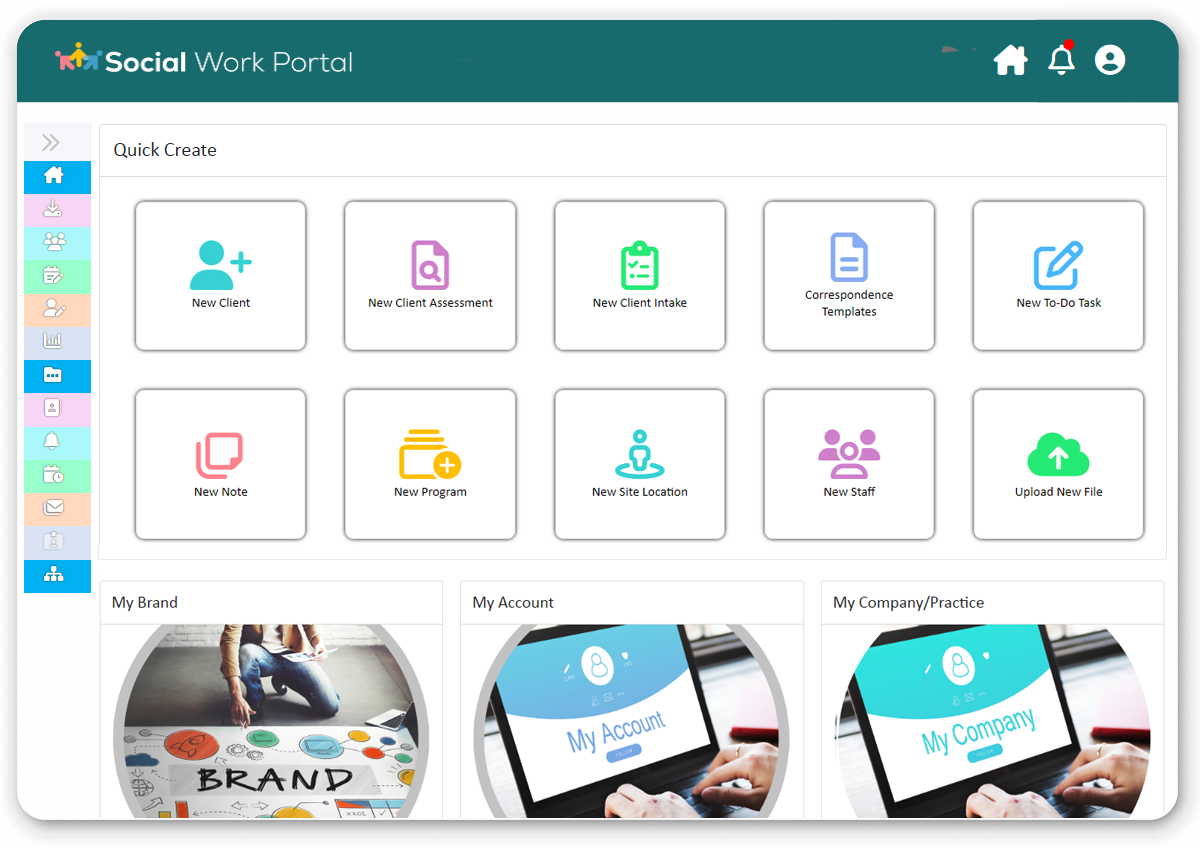 Case Management Hub Counseling Toolbox – Main Dashboard View
Case Management Hub Counseling Toolbox – Main Dashboard View
⋅ Comprehensive Counselling Case Management
With our mental counselors toolbox, managing your clients’ information becomes effortless.
Case Management Hub allows you to securely store and access client demographics, contact details, medical history, and counseling notes in an organized manner, ensuring you have all the essential information readily available.
⋅ Seamless Client & Case Management in Counseling
Case Management Hub counseling practice management software excels in facilitating efficient case management.
Whether you have a small practice or work as part of a multi-disciplinary team, our counseling EHR software enables seamless collaboration with other professionals.
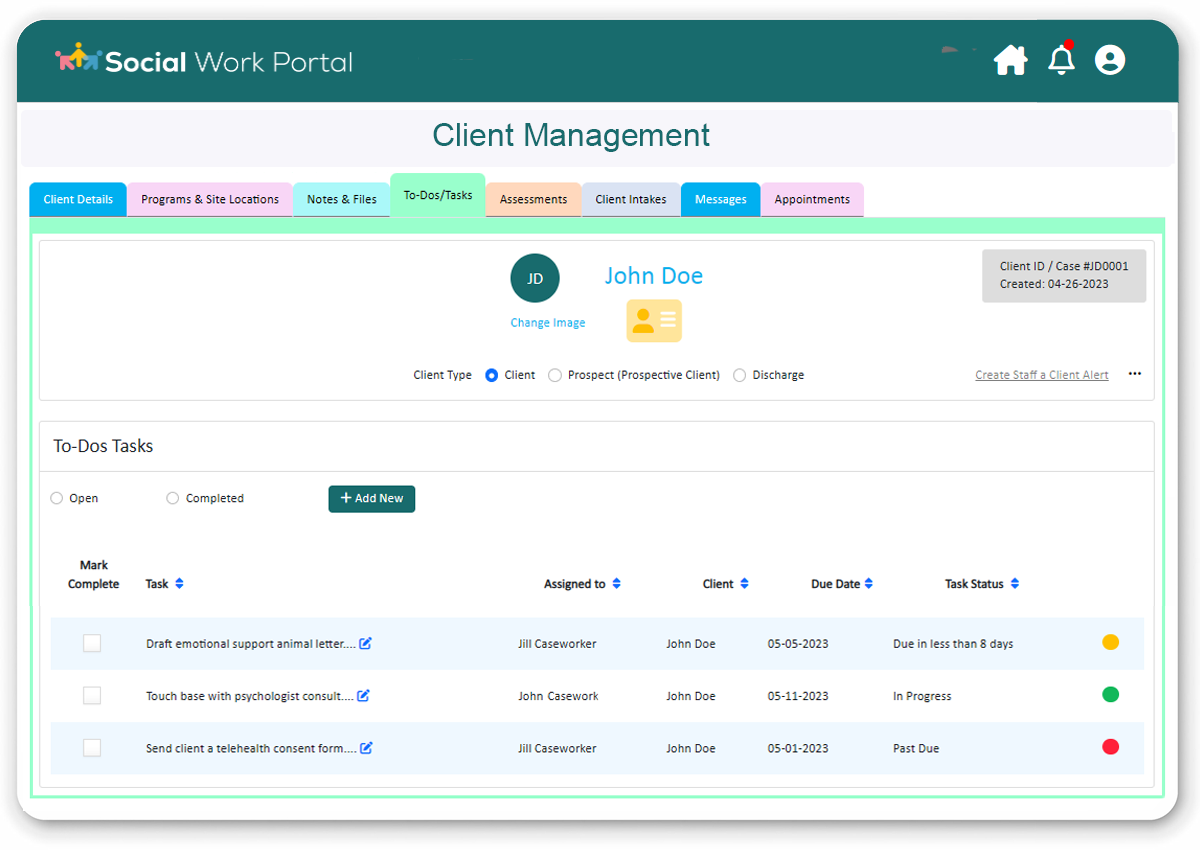 ⋅ Practice Management Software for Counselors with User-Friendly Interface
⋅ Practice Management Software for Counselors with User-Friendly Interface
Case Management Hub is designed with a clean and easy-to-navigate interface which makes this mental health counseling software effortless to access and use.
Our practice management software for counselors is user-friendly, allowing you to focus on providing exceptional care to your clients without unnecessary complications.
⋅ Data Security and Compliance
Case Management Hub counseling EMR employs robust security measures to ensure that client information is protected.
Additionally, our counselor toolbox software is designed to comply with relevant privacy and confidentiality regulations, such as HIPAA, ensuring that your practice remains in compliance with industry standards.
Sign up for SWP Client and Case Management Software now and experience the full potential of our comprehensive counseling tools.
What to Expect From Case Management Hub Counseling Practice Software and Counseling Assessment Tools?
⋅ Streamlined Intake Process
Case Management Hub simplifies the intake process with its user-friendly interface and intuitive sample intake forms for counseling. You’ll have access to a variety of intake counseling templates and the ability to create your own custom intake forms.
⋅ Comprehensive Counselling and Assessment Templates
Case Management Hub counselor toolbox offers a wide range of standardized counseling assessment tools that cover various mental health domains.
You’ll find counseling assessment tools for general mental health, anxiety and depression, substance use, children and adolescents, surveys, and the flexibility to create your own customized counselling assessment forms.
⋅ Customizable Templates and Form Builder
In addition to the standardized counseling and assessment templates, Case Management Hub counseling toolbox allows you to create and customize your own templates and counseling forms for private practice.
⋅ Restriction Free Sample Letters
With our restriction free sample letters, you can quickly and easily communicate with your clients in a professional and efficient manner. These pre-built templates can be modified to suit your needs and can save you a significant amount of time and effort in crafting individualized messages.
Our counselor toolkit comes with 30+ pre-made restriction free sample letters that you can customize and adjust to your needs.
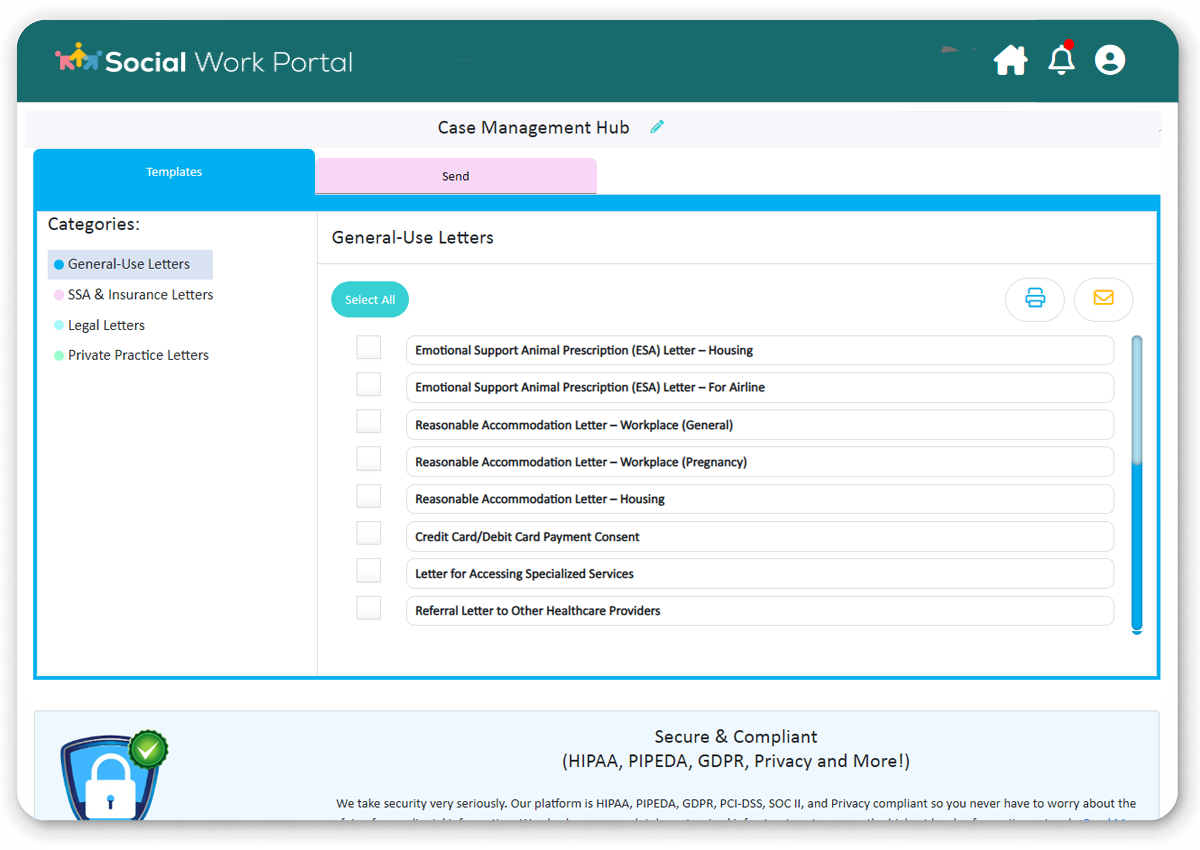 Restriction Free Sample Letters
Restriction Free Sample Letters
⋅ Seamless Integration with Client Records
Tools for counseling seamlessly integrate with client records within the Case Management Hub counselors toolbox. It ensures that all relevant information is easily accessible, facilitating comprehensive counselling case management and informed decision-making.
From general use free sample letters to letter counseling forms for private practice, CMH best counseling software has your needs covered.
⋅ Improved Evidence-Based Care and Outcomes
With a wide range of tools used in counselling, customizable templates, efficient data collection, integration with client records, and robust reporting capabilities, Case Management Hub counselor toolbox enhances your ability to provide evidence-based care and improve client outcomes.
These tools support accurate assessment, treatment planning, and progress monitoring, enabling you to provide accurate evaluation in counseling and deliver the highest quality of care to your clients.
Embrace a new level of efficiency in managing your counseling practice.
Join Case Management Hub today and witness the transformative difference it makes.
Read More: Best BPS Model Of Health | What You Need to Know
Conclusion | Best Tools for Evaluation in Counseling
We hope that you’ve enjoyed this SWP guide on counselling tools and templates and that you’ve found what you’ve been looking for.
From assessment instruments and therapy worksheets to intake forms and progress note templates, counselors have access to a diverse array of counseling tools to support their work with clients.
Standardized assessment tools allow counselors to gather comprehensive information, identify client needs, and monitor progress over time. Templates and forms streamline documentation processes, ensuring accurate and organized record-keeping while maintaining ethical and legal standards.
Furthermore, the digital age has brought significant advancements in the accessibility and convenience of tools and templates.
Online platforms such as Case Management Hub Counselor Toolkit Software and digital counselling resources provide practitioners with the flexibility to access, customize, and utilize these tools in various formats, such as PDF, DOC, and PPT.
This allows for easy integration into electronic health record systems, virtual counseling sessions, or traditional paper-based workflows.
As counseling continues to evolve and adapt to the changing needs of clients, the utilization of tools and templates will remain essential for counselors’ professional growth and the provision of high-quality care.
FAQ | Counseling Tools and Techniques Summary
What are some of the most common counseling assessment types?
Common counseling assessment types include:
• Initial Assessment in Counseling/Intake Assessment
• Diagnostic Assessment
• Psychosocial Assessment
• Behavioral Assessment
• Self-Report Measures
• Risk Assessment
• Clinical Interviews
• Progress Monitoring and Outcome Assessment
• Prepare Enrich Assessment
What are some common counseling resources and tools?
Common counseling resources and tools include:
• Unstructured Interview
• Structured Interview
• Semi-Structured Interview
• Standardized Instruments
• Projective Techniques
• Checklists and Questionnaires
• Observation
• Rating Scales
• And many more…
What forms are typically used during intake assessment?
Some of the most commonly forms used during intake assessment are:
• Client Information Form
• Informed Consent Form
• Intake Questionnaires
• Release of Information Form
What are some diagnostic assessment tools for counselling services?
Here are some common examples of diagnostic assessment tools for counselling services:
• Diagnostic Questionnaires and Rating Scales
• Diagnostic Checklists
• Counselling Worksheets for Symptom Analysis
• Diagnostic Decision Trees
• Diagnostic Formulation Counselling Worksheets
Note: Content on socialworkportal.com website is copyrighted.
Disclaimer: This Social Work Portal web site is provided for educational and informational purposes only and does not constitute providing medical advice or professional services. The information provided should not be used for diagnosing or treating a health problem or disease, and those seeking personal medical advice should consult with... Read our full disclaimer here: Social Work Portal Disclaimer.
Image sources: Stock.adobe.com



